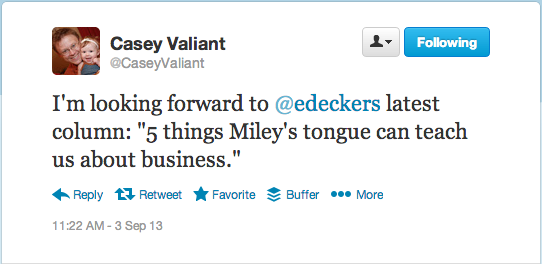If you’ve been keeping up with the news from Ferguson, Missouri, chances are a lot of the updates and photos are coming from individuals who aren’t journalists, posting live video feeds from their cell phones. When members of the traditional media were being arrested by the police, and the cable news stations were all kicked out or, in the case of Al Jazeera Television, fired at with gas grenades, it was often the alternative news sources and citizen journalists who fed us new information and updates.
Police telling media to “separate from protesters.” Protester: “let me pull out my phone, now I’m media.” This guy gets it. #Ferguson
— Alice Speri (@alicesperi) August 19, 2014
I spent most of last Friday night, as well as last night (Monday), following what was happening in Ferguson through a variety of Twitter users, including Vice News, Alice Speri, Ryan Reilly, and Adam Serwer, as well as alderman Antonio French (who was arrested Friday night), his wife @Senka, and several LiveStream, Ustream, and Vine users. That’s not to say the mainstream media wasn’t there — they were. But on that first night, most of the video footage and images they replayed over and over on CNN were coming from people uploading them from their phones to Twitter and Instagram.
Not seeing names or badge numbers on officers arresting Getty Images photographer Scott Olson in #Ferguson: pic.twitter.com/wus8VaT4R3 — Josh Rosenau (@JoshRosenau) August 18, 2014
Police-fired tear gas returned by a protester in #Ferguson pic.twitter.com/G0jFvHK6ez — Ben Kesling (@bkesling) August 19, 2014
I won’t rehash what’s been happening this week — the militarized police response, the protests, the tear gas and the flash grenades. The fact that you know about it at all is thanks to the mainstream media, the alternative and non-traditional media (Huffington Post, Vice News, Freedom of the Press), and citizen journalists. (Update: The police kicked nearly all the media out of the area at 12:00 am CDT, often pointing guns, firing tear gas, and threatening to arrest them. One journalist, Tim Pool, allegedly had his press badge ripped off his chest and told by a police officer, he “didn’t give a shit.”)
The last thing the media saw before being told to leave or face arrest. #Ferguson pic.twitter.com/xb9y5GUn6P
— Ben Kesling (@bkesling) August 19, 2014
Citizen journalists can range from anyone with a Twitter account and a cell phone to an independent news organization as complex as a large blog or an online news website, like The American Reporter (disclosure: I’ve been the humor columnist for the American Reporter since 1997). And anyone with that basic technology can record and disseminate news on a micro scale, or have your content seen around the world by tens of thousands of people.
While the term citizen journalists is often spoken with air quotes around that second word, especially by professional journos, they still play an important role in getting out early information. Ever since George Holliday recorded the Rodney King beating in Los Angeles 20 years ago with a Sony Handycam, private citizens have become citizen watchdogs against the police, the government, and in some cases, even the media themselves.
In many cases, they’ve been doing it without protection, at their own risk, and without the benefit of a publication’s legal team to back them up. They’re the people who find themselves at the center of the action and rather than run away, they pull out their cell phones, hit the button, and stand around a little longer than is safe or wise.
This means anyone can upload videos of things they think are wrong, or want to record for posterity and history.
#Ferguson update 5: For 1st time ever, @Amnesty International deploys human rights team in US http://t.co/nfGDw7wgBq pic.twitter.com/op8oHttydI
— Jim Roberts (@nycjim) August 18, 2014
Of course this means we also have to become critical thinkers and viewers, making sure that what we’re seeing is real, and not a hoax. That we’re re-sharing news from people we trust, and not just blindly retweeting everything with the trending hashtag of the day.
We Also Need to Trust Our Technology
But while we were watching Ferguson news on Twitter, it turns out Facebook’s algorithm didn’t even allow #Ferguson news to show up in our news feeds at all. On that Friday night, if you weren’t looking at Twitter, you didn’t even know anything was going on. (And if you rely on Twitter’s U.S. trending reports to see what’s happening, you were told that #ThatsSoRaven was infinitely more important than #Ferguson, as the tweens’ show trended that night, while the civil unrest in our own country was supposedly not even happening. The hashtag trended in individual cities like Indianapolis and Nashville, but not the country as a whole.)
Medium writer Zeynep Tufecki argues that this shows why not only is net neutrality important — what if Facebook and Twitter didn’t want us to know about Ferguson? They didn’t mess with the algorithm, but what if they had decided to play that card? — but even the technology used by both real and citizen journalists could be affected. California is considering legislation that will require “kill switches” in cell phones. While the technology is there to discourage violent cell phone theft, who’s to say an overeager militarized police department won’t force a wireless company to throw that same switch when they’re about to come down on a crowd of protestors?
Citizen journalism isn’t going away, despite the gnashing of teething and rending of garments by the professional journalists who look down on the amateurs with only slightly less scorn than a militarized police force. It’s here to stay, and as we’ve seen in Ferguson, it sometimes may be the only source of information we have for a while.
